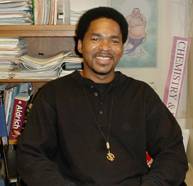 Professor Carol Fierke and Cassie Joiner welcomed Professor Teaster Baird from San Francisco State University (SFSU) for a series of discussions on inclusive teaching and a seminar of his current work. To start the day, Professor Baird met with several CSIE|UM graduate students and post-doctoral fellows for an informal breakfast to get to know the students and answer any questions they had. The discussion was centered on his path to a faculty position at SFSU and his role as an academic.
Professor Carol Fierke and Cassie Joiner welcomed Professor Teaster Baird from San Francisco State University (SFSU) for a series of discussions on inclusive teaching and a seminar of his current work. To start the day, Professor Baird met with several CSIE|UM graduate students and post-doctoral fellows for an informal breakfast to get to know the students and answer any questions they had. The discussion was centered on his path to a faculty position at SFSU and his role as an academic.
For the afternoon, Professor Baird held an open discussion with graduate students, post-doctoral fellows, and faculty members on inclusive teaching. He started off the discussion explaining how he implements inclusive teaching in his classrooms at SFSU. The common theme for this discussion was to take time to make the students feel like they belong and are apart of the classroom. The students’ scientific identities in the classroom is very important to their success.
Professor Baird then had the room team up and discuss our teaching strategies in the classroom and our future plans as educators. As the room was talking amongst themselves, he joined in each group to see the different perspectives that the groups had.
Professor Baird finished off his day at Michigan with a seminar titled, “Proteases & Pedagogy: Intentionally Blurring the Lines of Teaching and Research.” He started off his talk with a detailed description of the path that lead him to SFSU and how his status at each University (from undergraduate to post-doctoral work) changed how he envisioned his professional career. He stressed that a student’s status has a strong influence on how they see themselves and their
future.
He then transitioned into his work with serine proteases, specifically trypsin, and how he was able to take this project from his post-doctoral work and create an undergraduate lab around it. His common theme throughout his talk was the blurring of teaching and research and working to strengthen students’ scientific identities. As a research mentor he made sure that his students felt comfortable as scientists that they could ask intriguing questions and then allowed them to created and plan experiments to answer those questions. Professor Baird finished up his talk by illustrating what he had learned both about the science his lab has done, but also about how the status of the students, both in the lab and in the classroom, and how they view themselves as scientists can strongly influence their future. He stressed that, as an academic if was our job to work with them to help them find their scientific
identity.

